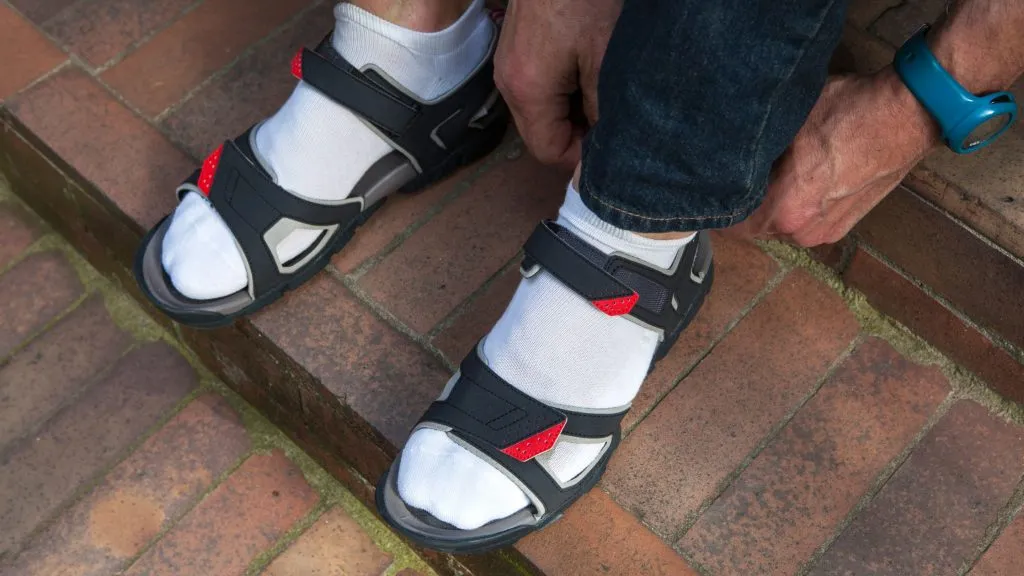Can you wear sandals on a plane? It sounds simple, right? But, as with many things in the world of air travel, there’s more to consider than just slipping on your favorite pair of flip flops. Whether you’re jetting off for a quick weekend getaway or embarking on a long-haul adventure, what you wear on your feet can impact your comfort, safety, and convenience.
From navigating the maze of airport security to considering the airline’s dress code and even thinking about fellow passengers, choosing the right footwear one of the most important things. In this post, we’ll dive into the dos and don’ts of airport and in-flight footwear, guided by insights from flight attendants, travel experts, and my own globetrotting experiences.

When you click on an Amazon link from my site the price is the same as if you searched for it yourself, but I get compensated. As an Amazon Associate I earn from qualifying purchases.
Can You Wear Sandals on a Plane?
Let’s start by answering the question, Can you wear sandals on a plane? Regular passengers can wear sandals on a plane! But before you decide to only bring the pair of sandals on your feet, consider the following tips. This section will guide you through choosing the best shoes for the duration of the flight and travel experience.
Navigating Airport Security with Sandals
One of the first hurdles you’ll encounter with sandals is airport security line. While they’re easy to slip off and on at the security checkpoint, walking bare foot on that cold tile floor is less than ideal. Personally, I do wear sandals to the airport. But, for the screening process I keep a pair of socks with rubber stickys on the bottom to slip on as I slip off my sandals.
Remember, that some types of sandals like Birkenstocks, might set off the metal detector. This can be a hassle, especially when rushing to catch a flight. For a smoother experience, consider sandals without metal embellishments or opt for TSA PreCheck to bypass some of the usual security checks.
Try These: My Favorite Minimalist Shoes for Women

I share products I love with you through affiliate links, which means if you buy something through one of these links, I get a small commission at no extra cost to you.
Comfort and Safety in the Skies
Once you’re on the plane, the key questions are comfort and safety. Sandals might seem like the ultimate comfort footwear, but they have downsides. Your feet can get cold for long flights, or you might want more protection for those walks down the aisle. Also, in the unlikely case of emergency situations, sandals offer less protection and grip than closed-toe shoes, raising safety concerns. While it seems like a bad idea to wear flip-flops on a flight, you can always wear them once you have landed and got your carry-on luggage out.
What About Airline Dress Codes?
Airlines generally don’t have strict dress codes but anyone traveling on an airline employee companion pass should check official websites for guidance. There have been numerous highly publicized stories about buddy travelers being denied boarding for wearing sandals, yoga pants, or leggings.
Some airlines might frown upon overly casual attire like flip-flops or bare feet, particularly internationally. It’s always a good idea to check the airline’s official website for specific guidelines. This way, you can avoid surprises and ensure a pleasant travel experience for yourself and your fellow passengers.
Can Airlines Refuse You for What You Wear?
When boarding a plane, your choice of attire can sometimes be as crucial as your boarding pass. While the majority of airlines often don’t advertise strict dress codes, cabin crew members can deny boarding to passengers for attire-related reasons. Any airline crew can site safety or security reasons for denial of boarding.
In general, the viral cases of people being denied boarding, at least in the United States is rare. All the instances I’ve seen have appeared to be more like an airline using wardrobe as an excuse to deny boarding for extremely out of line unruly passengers. My best advice would be, don’t be a jerk to airline staff.

Clothing Choices That Might Raise Eyebrows
Certain types of clothing might make a flight attendant or cabin crew member think twice before letting you on board. For instance, excessively revealing attire where you show so much skin, such as crop tops, sports bras, or short shorts, might be deemed inappropriate. The same goes for offensive clothing with problematic imagery or language. These choices can create discomfort among fellow passengers, something airlines strive to avoid.
Safety-First Attire
For safety reasons, airlines might also frown upon overly loose or restrictive clothing. In case of an emergency, such as emergency landing, tight clothing or less than ideal footwear can cause further damage or hinder mobility. Similarly, high heels or backless sandals can be a safety hazard, potentially impeding a quick exit or causing injury during emergency evacuations.
Deciding if you can wear sandals on a plane should be based on safety.

Practical Tips from Flight Attendants
Coming from a travel expert and other experienced cabin crew members wearing sensible shoes and comfortable pants, are the best options, especially for long-haul flights. The best travel shoes are ones with proper arch support and thick soles. These comfortable footwear provide stability and safety.
Making Sensible Choices for Your Journey
Ultimately, dressing appropriately for a flight means balancing comfort with respect for others and practicality for various scenarios. While open shoes and flip-flops might be tempting for their ease, closed shoes or slip-on sneakers are often the best choices.
Exceptions to Airline Policies on Dress Code
Regarding airline dress codes, there are always exceptions and special cases that travelers should be aware of. Understanding these nuances can help you navigate air travel with more confidence and less stress.

Special Considerations in Business Class and for High Fliers
In business class, the expectation for attire is often a notch higher. Airlines may expect business class passengers to dress more formally as a part of the premium experience. High fliers, including frequent travelers and those in elite loyalty programs, often opt for smart casual attire to align with these unspoken and unwritten norms.
A blend of comfort and professionalism is key. For men, this might mean chinos and a polo shirt, while women might opt for comfortable dress pants and a blouse. In footwear, avoid overly casual options like flip-flops, instead, choose something like loafers or elegant ballet flats.

Medical and Disability Considerations
Airlines are accommodating towards passengers who need to wear specific types of footwear for medical reasons. This includes orthopedic shoes, which might appear very safe but are necessary for some travelers.
If you’re wearing special footwear or carrying medical devices that might raise questions at security screenings, having a doctor’s note or medical certificate just to be on the safe side. This is especially useful for items that might trigger an alarm in the X-ray machine or require a more detailed inspection.
Cultural and Religious Dress Considerations
Airlines respect the cultural and religious attire of passengers. This can include traditional dresses, headscarves, turbans, and other religious garments. While these might differ from typical Western clothing norms, airlines generally support passengers wearing such attire.
It’s always a good idea to review the airline’s official website or contact customer service if you have specific questions about cultural or religious attire. Most airlines provide clear guidelines on their website or through their customer service channels.

Extreme Weather and Destination-Based Exceptions
Airlines often make allowances for appropriate attire if you’re traveling to or from a destination with extreme weather conditions. This might include heavy coats and boots for cold climates or lighter, more breathable clothing for tropical destinations.
In cases of extreme cold, wearing heavy-duty boots might be necessary and acceptable, even if they are bulkier and more challenging at security checkpoints. Conversely, more open footwear like sandals might be more acceptable in hot climates.
Children and Infant Travelers
Airlines are typically more relaxed about the dress code for children and infants. Comfort and practicality is always the best idea for kids, with a focus on easy-to-remove shoes, comfortable layers, and fuss-free clothing.
Maximizing Comfort on Long-Haul Flights
When preparing for a long flight, selecting the right footwear or comfortable shoes is crucial for a stress-free trip. Long hours in the airplane cabin can impact your feet significantly, so choosing shoes that provide support and ease is key. This is particularly true for those who may walk or stand during the flight.

Best Types of Footwear for Long Flights
Slip-on Shoes: Ideal for their convenience, slip-on shoes make navigating the airplane aisles and security lines a breeze. They’re easy to remove if you want to stretch your feet during the flight or quickly put them back on for restroom trips.
Sneakers with Thick Soles: Offering comfort and support, sneakers are excellent for long flights. Their thick soles can help cushion your feet, reducing the risk of discomfort or fatigue.
Ballet Flats or Comfortable Loafers: For those seeking a balance between style and comfort, ballet flats or loafers are great. They’re less restrictive than other shoes, allowing your feet some room to breathe and swell, which is common on longer flights.
Why Avoid Certain Footwear Types
High Heels and Stiletto Heels: These are generally bad for safety purposes. They can cause discomfort and aren’t practical for moving around in the cabin or going towards emergency exits.
Backless Shoes or Flip-Flops: While easy to slip on and off, they offer little support and protection. They’re also less secure on your feet, which cause injury in the event of an emergency.
Shoes with Metal Tips: While this pair of shoes is a hit in places like New York or Paris, they make any airport scanner go crazy at a security gate. It pays to just place them in your luggage and wear flip flops.

Additional Foot Comfort Tips
Carry a Pair of Socks: Even if you’re wearing open-toed shoes, carrying a pair of socks in your carry-on bag can be a lifesaver. They can keep your feet warm in the often chilly cabin and add a layer of comfort.
Compression Socks: For very long flights, consider wearing compression socks. They can help prevent swelling and reduce the risk of deep vein thrombosis, a health concern associated with long periods of inactivity.


